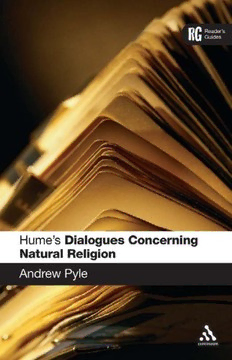
Hume’s "Dialogues Concerning Natural Religion": A Reader’s Guide PDF
Preview Hume’s "Dialogues Concerning Natural Religion": A Reader’s Guide
HUME’S DIALOGUES CONCERNING NATURAL RELIGION Continuum Reader’s Guides Aristotle’sNicomachean Ethics – Christopher Warne Heidegger’sBeing and Time – William Blattner Hobbes’Leviathan – Laurie Bagby Hume’sEnquiry Concerning Human Understanding – Alan Bailey and Dan O’Brien Nietzsche’sGenealogy of Morals – Daniel Conway Plato’sRepublic – Luke Purshouse Wittgenstein’sTractatus Logico Philosophicus – Roger M.White HUME’S DIALOGUES CONCERNING NATURAL RELIGION Reader’s Guide ANDREW PYLE Continuum International Publishing Group The Tower Building 80 Maiden Lane 11 York Road Suite 704 London SE1 7NX New York,NY 10038 www.continuuumbooks.com © Andrew Pyle 2006 All rights reserved. No part of this publication may be reproduced or transmitted in any form or by any means,electronic or mechanical, including photocopying,recording,or any information storage or retrieval system,without prior permission in writing from the publishers. Andrew Pyle has asserted his right under the Copyright,Designs and Patents Act,1988,to be identified as Author of this work. British Library Cataloguing-in-Publication Data A catalogue record for this book is available from the British Library. ISBN: 0 8264 7567 1 (hardback) 0 8264 7568 X (paperback) Library ofCongress Cataloging-in-Publication Data A catalog record for this book is available from the Library of Congress. Typeset by Servis Filmsetting Ltd,Manchester Printed and bound in Great Britain by Ashford Colour Press Ltd, Gosport,Hampshire CONTENTS Preface vii 1 Context 1 2 Overview of themes 9 3 Reading the text 16 4 Interpretations of the Dialogues 122 5 Reception and Influence 133 i Hamann and Kant 133 ii Paley 135 iii Darwin 138 iv John Stuart Mill 141 v TheDialoguestoday 142 Notes 144 Guide to Further Reading 147 Index 153 v This page intentionally left blank PREFACE This Reader’s Guide is designed to be read as a close and detailed commentary on the text. The most suitable version of the text for students is Gaskin’s edition for Oxford World’s Classics (1998).The advantages of Gaskin’s edition for our purposes are significant.The Dialoguesare here bound together with Hume’s mini-autobiography My Own Life, the Natural History of Religion, Section XI of the Enquiry concerning Human Understanding,and an important letter from Hume to his friend Gilbert Elliot. All the most important textual materials are thus conveniently included in a single reason- ablypriced volume.Gaskin also provides a wealth of valuable edi- torial material and explanatory notes.Page references for quotations will be given to Gaskin’s edition (e.g.G93).Students using other edi- tions should still find it easy to locate quotations: the Dialogues divide into short parts,and the Guide discusses those parts in strict sequence.Quotations will also be prefixed with [C],[D] and [P] for Cleanthes, Demea and Philo respectively: to understand the sub- tleties ofHume’s arguments it is essential to know at any given point of the discussion which of the three central characters is speaking. vii This page intentionally left blank CHAPTER 1 CONTEXT I HUME’S LIFE David Hume was born in Edinburgh on 26 April 1711,the younger son ofa family ofminor gentry.His elder brother John inherited the family estate at Ninewells near Berwick-upon-Tweed on the Scottish borders, leaving David only a modest inheritance. He studied at theUniversity of Edinburgh from 1723 until 1725 or 1726,leaving without taking a degree. From 1726 until 1734 he read intensively with a view to seeking a career in the law,but in fact devoted his time and energy to his real loves – philosophy and the classics. After a brief but abortive attempt to make a living in the commercial world of Bristol,he settled from 1734 until 1737 in France,where he wrote his Treatise of Human Nature in three books, dealing respectively with the understanding,the passions,and morality.Hume returned to Britain to publish the Treatise(1739–40),but its reception disap- pointed him.He had hoped for violent attacks from the clergy and asuccess de scandale,but received only neglect and indifference from the learned world. Hume’s reputation as a sceptic in matters ofreligion did,however, prevent him from gaining an academic position. In 1744–5 he was a candidate for the Chair of Moral Philosophy at Edinburgh, but the disapproval of conservative clerics blocked his appointment. (Asimilar disappointment was in store for him in Glasgow in 1752.) He spent a year as tutor and companion to an insane young noble- man, then became secretary to General St Clair, first for a naval attack on the coast ofBrittany in 1746,then on a diplomatic mission to Vienna and Turin in 1748.These visits helped to turn Hume into a well-rounded man of the world, with a cosmopolitan mentality 1
